
After 18 months of pandemic, I need a vacation, you need a vacation, we all need a vacation! With vaccinations increasing and travel limitations decreasing it seems possible to make plans and travel in the near future. I have two trips on the books! We’re visiting family in Arizona in June and then will celebrate our 25th wedding anniversary in Hawaii in September. Things are looking up!
Going on vacation is fun and necessary but it can also be a chore. We might be concerned about how work will be covered in our absence, what we might miss, e-mail and other interruptions during our trip, and how much we will have to do to catch up on return. Ugh. You might be thinking, “It would be easier to skip it entirely.”
But after the year and a half we’ve had, we can’t do that. We truly need to take time to rest, process and re-charge. Even if your vacation is close to home, taking time off from work and the everyday demands of life is necessary for mental health and can also help improve productivity.
Making reservations and plans is only part of the vacation picture. We also need to prepare at work for departure, have a plan for managing messages and emergencies while we are away and a plan for re-entry. Stay with me now. Think of this as an investment in your wellbeing and quality of life. If you take the long view and prepare, your vacation can be more relaxing and enjoyable and your return less stressful.
1. Plan and Communicate.
Planning starts by looking at your calendar and deciding when to take a vacation. Some swear by going at the last minute when the opportunity arises. This can work if you have good support and systems in place for managing work in your absence which you can “set and forget” at a moment’s notice. Most of us, particularly lawyers, might have a harder time doing that. Instead, schedule vacation dates at least three months in advance. Block them out on your calendar now. Alert staff, colleagues, clients and others that you will be away and unreachable during those dates. Invite them to contact you now with any questions or concerns. As your vacation date approaches, consider adding a line to your e-mail signature line and outgoing voice mail of the dates you’ll be away, when to expect a response, and how to reach your staff or others with emergencies in your absence.
For “next level” vacation preparation, also block out two work days before you leave and at least one day after your return to the office. Don’t schedule any appointments or meetings on these dates. Use that time to prepare to leave and to catch up upon returning. Giving yourself this extra time can reduce the stress of leaving and re-entry. You’ll have time to wrap up projects, create instructions for assistants and maybe even to tidy up your desk.
2. Manage Messages and Emergencies.
Decide before you leave how you will engage with messages and communicate with the office. Daily? Whenever? Not at all? These are all reasonable options but you will get more out of your time away from work if you don’t take work with you on vacation. Could you scan e-mail messages and texts once a day or so, delete junk mail and make sure there are no fires? Maybe send a one word reply or brief instructions to staff, if needed? Avoid checking e-mail constantly and be stingy with replies. Keep your e-mail check in time to an hour or less and then immerse yourself in vacation the rest of the time.
Consider how emergencies can be handled while you are away. Can you designate a colleague or staff person to handle them? Some solos set up a “trade” with a colleague for vacations or hire a contract attorney to keep an eye on their practice while they are away. Talk with your staff or other support person a week or more before you leave about how to handle emergencies, what to tell clients and when to contact you. You might want to designate a time when you will check in with them during your vacation or give them a way to reach you on vacation if they have questions or problems. If you will be completely unreachable for any period of time, make sure a licensed attorney is monitoring your mail and messages.
3. Prepare for Re-Entry.
Before you leave, check in on all of your open matters and projects. Create and/or update your Master Case (or Projects) List and review it with your staff. Wrap up any loose ends and attend to anything that might need attention before your return. Make notes to the file and alert staff or colleagues to any potential issues to look out for. Review your calendar and obtain extensions for any deadlines during your vacation or that would arise the week of your return. Block out your first (and second?) day back in the office just for re-entry: process messages and mail, connect with staff and colleagues, assess your calendar and plan for upcoming deadlines. Giving yourself some breathing room in this way means that you can return to work without “hitting the ground running” and therefore losing some of the benefit of taking time off. Or, complete projects before you leave that will be due soon after your return.
If you can’t remember the last time you took time off, it’s time to do it now. Go ahead. Pull up your calendar, look ahead a few months, grab a week and then make plans for a restful, relaxing and fun vacation. You will be glad you did.
I help clients get more out of their work and life, including vacations and other time off. Coaching has helped them and can help you work more efficiently and effectively and have more time for life. Want to learn more? Contact me for a free 30 minute consultation: 503-734-7232 or heather@tcbcoaching.com
